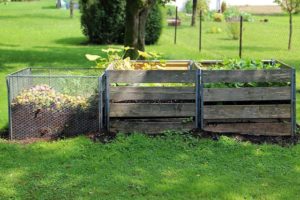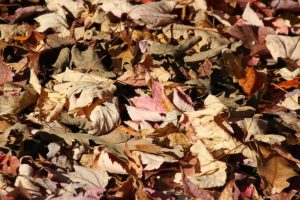Compost vs. Mulch: What’s the Difference?
What’s good for your yard, protection for your garden, and easy to create yourself? You got it – both compost and mulch! But what is the difference between these two landscaping staples and how can they be used effectively in your Colorado garden? Let’s have a look.
What’s the Difference Between Compost and Mulch:

Compost is an organic matter that has decomposed and turned into a rich, dark brown color that has only a mild odor. Many items can be composted including vegetables and food scraps, paper napkins, hay and grasses, eggshells, dried up old spices, pet hair, lawn clippings, and paper towels to name a few!
You can create compost at your home (check your city ordinances for any wildlife concerns) by creating a pile, using a composter in the backyard, or a container in your kitchen. Many Colorado waste collection services will allow you to separate compostable items into a bin that they will collect to create community-available compost.
Mulch is also an organic matter that requires no aging or decomposing before it is used. There’s a wide range of materials that can be used as mulch including grass clippings, straw, shredded leaves, and cedar chips.
Because mulch is a ready-made material, there’s very little prep you need to do to have it available to use in your yard. Grass clippings, for example, can be used immediately and leaves just need to be put through a shredder to use effectively.
Where in My Yard do I Use Compost vs Mulch?

So now we know what compost and mulch are, how do you use them in your landscape?
Compost has many uses: As an amendment to Colorado’s challenging soil, you can add or dig compost into garden beds, add compost to the soil when you are adding new plants, and turn it into your vegetable garden for extra food for your plants. Compost is full of great nutrients to kick-start your landscape.
Where compost is used inside your soil, mulch is applied on top of your landscape.
Mulch helps to keep weeds from germinating, insulate the ground from extreme temperatures and intense sun, reduce erosion, and helps our dry Colorado gardens retain moisture. Mulch will gradually break down over time and, when this happens, also adds some nutrients to the soil.
Go Organic with BOTH Compost and Mulch
From within the soil and on top of the soil, compost and mulch are the dynamic duo for successful Colorado landscapes.
Get in the habit of adding high-quality compost to your soil when:
- You are planting, transplanting, starting new beds, caring for established plants, and getting your vegetable garden ready for a new season.
- Compost is a natural way to apply a slow-release fertilizer for plants.
Mulch also provides many benefits for your Colorado soil:
- A natural way to help the soil keep precious moisture, mulch holds in water and minimizes evaporation from rainfall, snowfall, and watering. This protection allows plants to flourish.
- Likewise, mulch will fight weeds and regulator soil temperatures during temperamental Colorado weather. Mulches also come in nice, natural colors to help define areas of your landscape and add further beauty.
Are you planning your home landscaping projects for the upcoming season? Contact us! The Landscaping Company are experts in creating, installing, and maintaining the most beautiful landscapes in the Denver metro area – we are here to help your landscape look its best!

